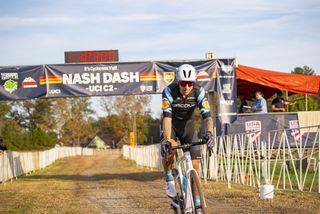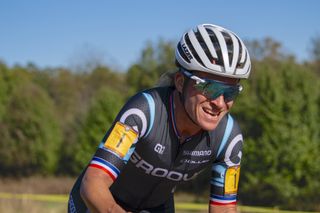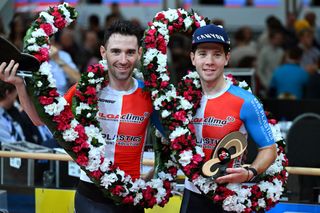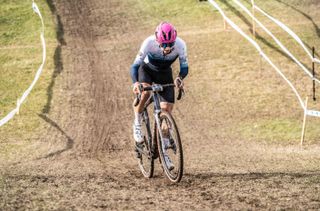Gent-Wevelgem 2017 race preview
Sagan, Boonen, Kristoff and Van Avermaet clash once more





After Dwars door Vlaanderen and E3-Harelbeke earlier in the week, Sunday's Gent-Wevelgem marks the third Flemish cobbled classic in the space of five days, and the final stop before the Tour of Flanders seven days later.
Gent-Wevelgem has the reputation of being the most sprint-friendly one-day race of what's known as Flemish cycling week, though a glance down the results of recent years would suggest that's a tag that is wearing increasingly thin. Last year, in a bid to further blur the balance of the race, the organisers introduced a second ascent of the Kemmelberg, the race's emblematic climb, but this time from the steeper side, and world champion Peter Sagan duly won from a group of four.
Even if there is a group sprint, it will be a far from a fresh one. There may be fewer climbs than the other Flemish races, but the wind can blow as the route eschews the customary hellingen around Oudenaarde to head towards the north coast before taking in the climbs of West Flanders. With a distance of 249km – just 10km shy of the Tour of Flanders – it's sure to be an exacting day in the saddle.
The official name of the race carries the tag 'In Flanders Fields', traditionally traversing some of the battlefields of the First World War, and this year a special tribute to the lives lost will come in the form of 'plugstreets'. These are gravel roads found not far from one of the sights of trench warfare, where British and German soldiers famously played football in no-man's land during the Christmas 1914 ceasefire.
As race director Hans De Clercq said, "By integrating the Plugstreets in the itinerary, there will be combat once again, although this time, luckily, by bicycle. In addition, we also pay tribute to the victims and the viewer can commemorate the fallen in an appropriate manner."
Patrick Lefevere and Jan Bakelants may vent their frustration and argue that not every race needs imitate the popular Strade Bianche, but the change is unlikely to have a pivotal impact on proceedings. That said, the 4.7km of farm tracks, which are exposed to the wind, add another layer of difficulty and unpredictability to a race that is already finely poised.
The route
Race names can often be misleading, and Gent-Wevelgem doesn't technically start in Gent, but in the village of Deinze to the southwest. From there it's a fairly flat jaunt northwest towards the coast and the French border, where the wind should be blowing and the riders will have to be on high alert, despite the first climbs being some distance away.
The first one, the Catsberg, comes on French soil after 135km, and it kicks off an intense spate of climbs that signals the first phase of attrition. The Koreelberg and the Vert Mont precede a double ascent of the Mont Noir, from different sides, meaning the first five climbs are ticked off in the space of just 14km.
There's almost 20km for things to settle down before the first of two ascents of the Banenberg, which is paired on both occasions with the Kemmelberg. On the first passage the climbs are separated by eight kilometres, although the Kemmelberg is followed almost immediately by the Monteberg.
A stretch of 30km without a categorised climb will be key, as those who have missed out on the selections desperately try and regain a grip on the race, while those out front look to form alliances and establish a race-winning advantage. It's far from straight forward, however, as the riders take on the aforementioned 'plugstreets', with 4.7km of the rough stuff across three narrow stretches.
The second ascent of the Banenberg signals the start of the end game with just under 40km remaining. It's followed a few kilometres later by the steeper side of the Kemmel, which has been said to be the toughest climb in Flanders, averaging 11.6 per cent gradient and reaching well over 20 per cent in parts. That will no doubt force a further selection, though the 34km run to the line will ensure the race hangs in the balance, with tactics playing an increasingly important role all the way to the line in Wevelgem.
The contenders
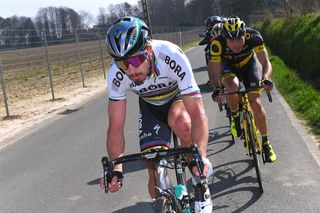
'Pure sprinters' are few and far between on this year's start list, with Fernando Gaviria (Quick-Step Floors) and Caleb Ewan (Orica-Scott), who's continuing his cobbled apprenticeship, being the fastest on paper.
More likely to be raising their hands across the line, however, are the fast men who sit somewhere in the middle of the sprinter-classics rider Venn diagram. The likes of Alexander Kristoff (Katusha), John Degenkolb (Trek-Segafredo), Peter Sagan (Bora-Hansgrohe), and Arnaud Demare (FDJ) are all riders who can roll with the many punches dished out over the course of a race such as this and still produce a powerful sprint – from a small or large group – at the end of it.
Sagan, winner last year and in 2013, starts as the bookmakers' favourite, though you'd struggle to find a race this spring where that isn't the case. Another certainty this and every spring is that Quick-Step will have an abundance of options. On top of Gaviria, three-time winner Tom Boonen will be making his final appearance, while Zdenek Stybar, Niki Terpstra, and Matteo Trentin make for a collective strength that will be the envy of all others.
Local favourites Greg Van Avermaet and Sep Vanmarcke lead the line for BMC and Cannondale-Drapac respectively, and are both thoroughbred classics men who'll be hoping for a selective race, as will Oliver Naesen (AG2R-La Mondiale), who proved he belongs with the best after his podium at E3 Harelbeke.
Jasper Stuyven provides another option for Trek, who can also rely on Edward Theuns for a fast finish, while Tony Martin could be a useful foil for Kristoff at Katusha. Team Sky bring their cobbled co-leaders Luke Rowe and Ian Stannard, but Danny Van Poppel could be in the frame should a bunch sprint materialise.
Other riders who pose a threat are Dutch champion Dylan Groenewegen (LottoNL-Jumbo), cobbles novice Michael Matthews (Sunweb), who can be relied upon to sprint strongly at the end of a long day, and Sonny Colbrelli (Bahrain-Merida), who won a leg-sapped sprint at Paris-Nice and finished at the head of the main peloton at E3.
For the full start list of riders, click here.
Get The Leadout Newsletter
The latest race content, interviews, features, reviews and expert buying guides, direct to your inbox!
Patrick is a freelance sports writer and editor. He’s an NCTJ-accredited journalist with a bachelor’s degree in modern languages (French and Spanish). Patrick worked full-time at Cyclingnews for eight years between 2015 and 2023, latterly as Deputy Editor.
Most Popular
Latest on Cyclingnews
-
Nash Dash Cyclocross: Mani and Werner sweep C2 elite races with Alexis Magner and Ty Magner in top 10
Cusack and Funston repeat with second-place finishes in Georgia races -
Nash Dash Cyclocross: Caroline Mani and Kerry Werner win C2 openers in Georgia
17-year-old Lidia Cusack earns first UCI elite women's podium -
Benjamin Thomas and Fabio Van Den Bossche win Gent Six Day with stunning late attack
Week-long leaders Lindsay De Vylder and Robbe Ghys finally finish second -
Canadian Cyclocross Championships: Ian Ackert adds elite men's national title to collection
Gunnar Holmgren second and Tyler Clark third on muddy Lévis course in Quebec
